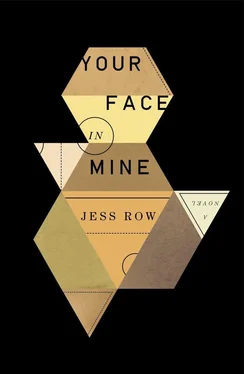So what you’re saying, I say, I mean, for you , in any case, we’re not talking about a racial dysphoria, a disorder, a sense you were born in the wrong body—
Freud says that before anything else, the ego is a body ego.
What the hell does that mean?
She shrugs. It’s pretty simple, she says. You have to listen to what your body’s telling you. At any stage. We’re so focused on child development, adolescent development — as if, as adults, we stop changing and become one solid thing! Why shouldn’t I wake up one day and say, I need to change ? No, it wasn’t always there. Not for me. No, it wasn’t biological. I wasn’t born in the wrong body . Whatever that means. Will I survive how I am? Of course. But why settle for survival? We’re talking about choice. Conscious, adult, rational choice. Should I use these words? Consumer choice. Does that make you uncomfortable?
Should it?
Of course it should. Are you kidding? Why do you think I’m here? Because we’re on a mission of mercy, operating on babies with cleft palates? Or to cash in, once it’s all revealed? For me this is political. Somebody has to do it.
If it’s political, are you for or against it?
What do you mean?
I mean, is this a protest? Are you, say, antibiotechnology, against cloning and eugenics, consumer subjectivity, that kind of thing? Or is this a transgressive, liberatory, post-human project? You’re telling me I’m supposed to be uncomfortable; what am I supposed to be uncomfortable about ?
You really want an answer to that question?
No. I want to go to bed. But since you’re here, yes, absolutely.
Well, okay. You took feminist theory in college, right? Remember the chora ? The chora is a provisional term for something that can’t be described. Your original, prelinguistic self. Before you can even really call it a self . The state of perfect harmony between inside and outside. Milk flows in, shit flows out. What Lacan called the Real. Before gender, before any idea about what you are. It’s like the dark matter of human identity. We all know it’s there, but we can’t prove it directly.
And what does this have to do with—
Impatient, are we? Just listen. So the whole question that biotechnology raises, you know, is, in a way, can we get back to the chora ? I mean, is there a way of cracking open our consciousness so that we can get to the state before determination, before categories existed?
Pre-individuation.
Well, that’s exactly the question, right? Is there such a thing as a self before there’s a racial self, a male or female self? It’s one of those classic mind-body questions. If doctors could sustain your brain after your body died, and preserve, say, your optic nerves, so you’d just be a brain and two eyeballs in a jar, capable of seeing the world, capable of consciousness, but otherwise body-less, who would you be? Would you be yourself? Would you still be Kelly? In other words, if consciousness isn’t embodied, is it even still human? Okay, so that’s still a theoretical question. But what if we made consciousness portable , across racial lines? It’s like nuclear fission, you know, one of those projects that could create limitless electricity for the planet, only there might not be a planet at the end of it. It’s the nuclear option. We have to decide, if we had the choice, would we eliminate gender? Would we eliminate race? Or, rather, make it all a matter of choice, a matter of means? That’s what I want to find out. After all this theoretical babble, finally there’s a way to test what we’ve all been talking about.
Give me a hit of that, would you?
She grins. I was wondering when you were going to say that, she says. Want me to roll you another one?
Not unless you’re afraid of my germs.
Hold on a second. Let me get it going.
She lights the joint, stands up, and comes over to me. From where I’m sitting, when she lifts her arms, I can see the pinkish, freckly skin of her stomach, the large mole next to her belly button, the slight pudginess around the waistband of her jeans. I’m thinking about the way a woman’s pelvis, from my point of view, in any case, always seems to point into itself, seems to draw the eyes down between the legs, a kind of gravitational pull. She turns the joint around, leans over, and puts it carefully, unnecessarily, between my lips, the neck of her shirt hanging open. She’s not subtle. I suck the smoke greedily, and hang on to it, gritting my teeth, and exhale, feeling my pores opening, my tissues softening. Then the rawness catches in my throat and I have to cough.
I used to think, I say, when I’ve regained the ability to speak, that that’s what Wendy and I were doing when we had Meimei. A child in between. Indeterminate.
And did it work out that way?
I used to love playing with people’s heads. We’d be sitting in Baskin-Robbins, just me and Meimei, chattering away in Chinese, and from the back — or from a certain angle — with her you couldn’t tell. Her hair was a kind of tawny, deep-maple color. Occasionally there’d be some old woman watching us, with a screwed-up face, you know, one of those Fox News fanatics, the ones who believe that Obama’s a Muslim and the Chinese are taking over. And I would lock eyes with her. Just to say, this is the future. This is what you’re scared of. Meimei never noticed, of course. And the truth is that no one would have doubted she was anything but Chinese. She had just enough of the eyes and the skin tone. And, of course, her name. I insisted on the name. Wendy wanted to call her Julia. It was all just wishful thinking, all of it.
Why do you say that?
Well, what were we pretending, exactly? What was Wendy pretending? That she would find some happy medium? She believed so completely in America, but even so, she was already sick of it. That’s a terrible thing to say, but it’s true. Anyone who believes immigration is some kind of panacea hasn’t actually met many immigrants. They turn hard, most of them; they curl up, they desiccate. All that imaginative effort, all that plasticity — it lasts a year or two, and then it stops. You learn the language, or not. You assimilate, or maybe leave it to the kids. And then the kids — I mean, an American childhood is an ugly thing, even to those of us who lived through one ourselves. Cheetos and Super Mario Brothers and belly-button rings. All that sugar. All that waste . She hated shopping for Meimei — going to Babies “R” Us or Target or Whole Foods and having to walk down those long aisles. It made her nauseated. She said so. All that insulation, all that bourgeois padding. That’s what she craved, and that’s what would have done us in, in the end.
I came pretty close to having that life myself, she says. I had a Wendy once, too. In Providence. Ryan was his name.
Another professor?
No, no, he worked at a coffeehouse. A townie. He went to — what do you call it? — community college. His professors were all hardcore Marxists. Althusserians, neo-Maoists, Sandinistas, Shining Path. He was dying to have a baby with me. Class war through interbreeding. It was what the whole place believed in, apparently. We used to sit on my balcony and drink cheap Chilean wine and he would get all choked up talking about the Fifth International and Year Zero. I almost did it, too.
What? Became a convert?
Had a baby. I had an offer from Tufts; I could have stayed. We might have been in the same playgroup.
I wouldn’t have stayed with Ryan, of course, she says. And that’s what did us in, in the end. He knew. I was intractably bourgeois, a weak utopian. Like you were. She reaches out and passes a finger across my forehead, as if to smooth my hair. Know what that means? Of course not. I wouldn’t have. It’s from Lenin. We’re liberals, we can’t help it; we negotiate our dreams. He called it absolute impotence, playing at democracy without really believing in it. Or, in this case, playing at equality. The end of racism. Wishful thinking. Whatever else you want to call him, Martin’s not utopian. That makes him a revolutionary. The courage to act . That’s what got me. I was searching for something else. Shopping, actually. Looking for makeup, something a friend recommended, when Orchid’s website came up. The beta version. I must have typed some weird combination of keywords. Anyway, he happened to be in the office here, and I managed to get him on the phone.
Читать дальше












